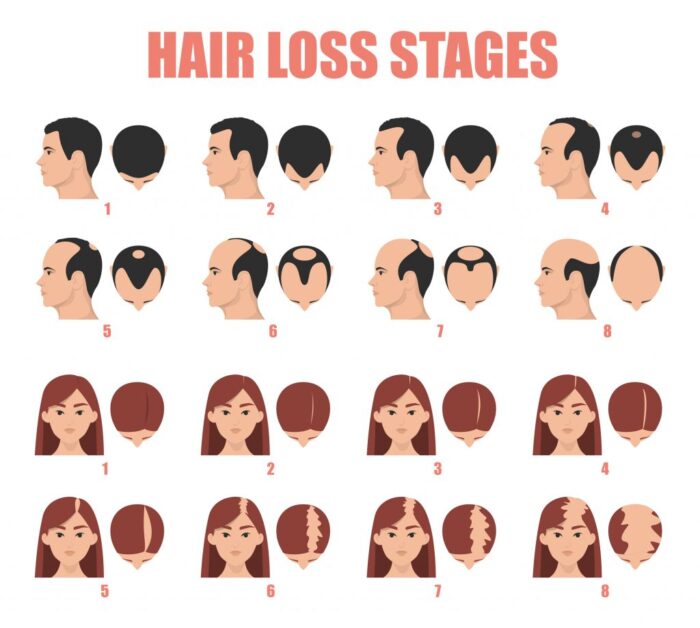Introduction
The fitness and bodybuilding communities use creatine extensively as a supplement. It is renowned for its capacity to improve physical prowess, raise muscle power, and encourage muscle development. But there are questions and rumours going around about whether creatine can result in hair loss. In order to provide you a thorough grasp of this subject, we will examine the connection between creatine and hair loss in this article.
Understanding Creatine
Low levels of the naturally occurring element creatine can be found in multiple foods, like meat and fish. It is generated as well by the human body’s liver, kidneys, and pancreas. During intense exercises, creatine is necessary for providing glucose to cells, particularly cells in muscles.
The Mechanism of Hair Growth
It’s crucial to comprehend the mechanics of hair growth before delving further into the connection between creatine and hair loss. Hair growth occurs in cycles, consisting of three phases: anagen (growth phase), catagen (transition phase), and telogen (resting phase). Each hair follicle goes through these phases independently, resulting in the continuous growth of hair.
The Connection between Creatine and Hair Loss
Anecdotal evidence suggests that using creatine supplements may cause hair loss. However, there is currently no scientific evidence to directly link creatine to hair loss. Hair loss is a complex issue that is influenced by a variety of factors, including genetics, hormones, age, and overall wellness. It is unlikely that creatine alone can cause significant hair loss.
Research Studies and Scientific Evidence
Several research studies have investigated the potential connection between creatine and hair loss. These studies have not found any conclusive evidence supporting the claim that creatine causes hair loss. In reality, a study that was found that taking creatine supplements has little effect on male pattern hair loss has been released in the Bulletin of the International Federation of Sports Nutrition.
Factors Influencing Hair Loss
Hair loss can be attributed to various factors, including genetics, hormonal changes, nutritional deficiencies, stress, certain medical conditions, and medications. It is essential to consider these factors before attributing hair loss to creatine usage alone.
Proper Usage of Creatine
To minimize any potential risks associated with creatine usage, it is important to follow recommended guidelines. Start with a lower dosage and gradually increase it if needed. Stay hydrated by consuming an adequate amount of water, as creatine can cause water retention. Additionally, consult with a healthcare professional or a qualified fitness expert before starting any supplementation.
Mitigating the Risk of Hair Loss
If you are concerned about hair loss while using creatine, there are certain measures you can take to mitigate the risk. Ensure a balanced diet rich in essential nutrients, particularly those beneficial for hair health, such as vitamins A, C, D, and E, as well as minerals like zinc and iron. Avoid excessive stress, maintain a healthy lifestyle, and practice good hair care habits.
Natural Alternatives to Creatine
If you are still worried about the potential side effects of creatine or prefer natural alternatives, there are some options to consider. Here are a few natural substances that have been suggested to enhance athletic performance:
- Beetroot juice: Beetroot juice is rich in nitrates, which can improve blood flow and oxygen delivery to muscles, potentially enhancing performance during exercise.
- Tart cherry juice: Tart cherries contain antioxidants that can help reduce muscle soreness and inflammation, allowing for faster recovery.
- Beta-alanine: Beta-alanine is an amino acid that can increase muscle carnosine levels, improving exercise capacity and reducing fatigue.
- BCAAs (branched-chain amino acids): BCAAs, including leucine, isoleucine, and valine, are essential amino acids that play a role in muscle protein synthesis and may help reduce muscle damage during intense workouts.
Lifestyle and Hair Health
Maintaining overall hair health is crucial regardless of creatine usage. Here are some lifestyle tips that can help promote healthy hair:
- Follow a balanced diet: Ensure your diet includes a variety of nutrients like protein, vitamins, and minerals that support hair health.
- Avoid excessive heat and styling: Limit the use of heat styling tools, as excessive heat can damage the hair shaft and lead to breakage.
- Protect from UV rays: Shield your hair from prolonged sun exposure by wearing a hat or using hair products with UV protection.
- Manage stress: Chronic stress can contribute to hair loss, so practice stress management techniques like exercise, meditation, or seeking support from a professional.
- Gentle hair care routine: Use mild shampoos and conditioners suitable for your hair type, and avoid harsh brushing or pulling that can cause hair breakage.
Conclusion
In conclusion, there is currently no scientific evidence to support the claim that creatine causes hair loss. Hair loss is a complex issue influenced by multiple factors, and attributing it solely to creatine usage would be misleading. Proper usage of creatine, along with a healthy lifestyle, can minimize the potential risks and promote overall hair health. If you have concerns about hair loss, it is advisable to consider other factors such as genetics, hormones, and overall health before solely attributing it to creatine usage.
FAQs
1. Is it safe to use creatine for athletic performance?
Yes, creatine is generally considered safe and effective for improving athletic performance when used within recommended dosages. However, it is always recommended to consult with a healthcare professional or a qualified fitness expert before starting any supplementation.
2. Can creatine help with muscle growth?
Creatine is known for its ability to enhance muscle strength and promote muscle growth. It works by increasing the availability of energy to the muscles, allowing for improved performance during high-intensity workouts.
3. How long does it take to see the effects of creatine supplementation?
The effects of creatine supplementation can vary from person to person. Some individuals may notice improvements in strength and muscle mass within a few weeks, while others may take longer. Consistency in supplementation and proper training are key factors in maximizing the benefits.
4. Are there any specific populations that should avoid using creatine?
Individuals with pre-existing kidney or liver conditions should exercise caution when considering creatine supplementation. It is always recommended to consult with a healthcare professional if you have any underlying medical conditions or concerns.

